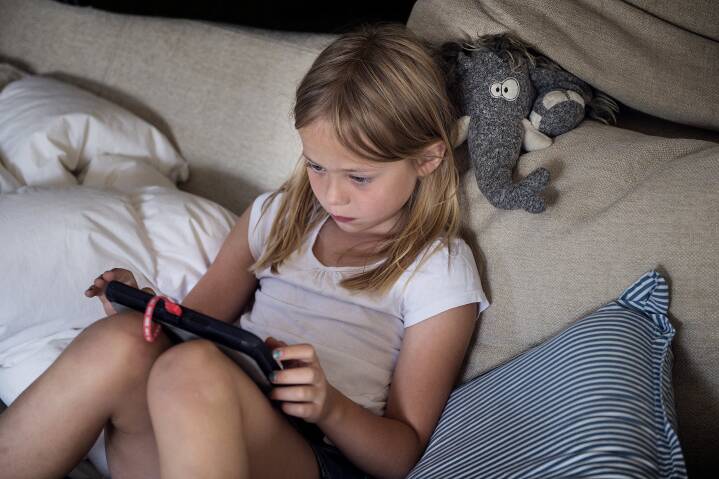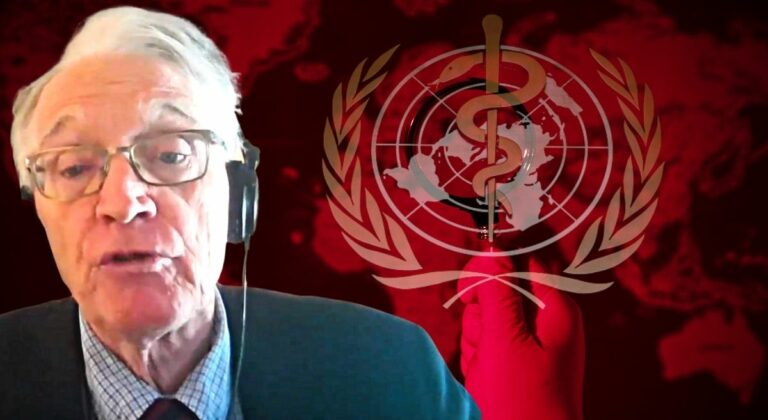‘It’s Total Neglect’, says Psychologist who wants the Internet out of the Nursery
Source: By Sofie Persson, 25 March 2024, Nya Dagbladet
Psychologists warn that violent videos on social media are creating a generation that is more vulnerable and at the same time more emotionless
“We allow hell´s angels to be in the digital school yard. This is a total neglect of our children,” says psychologist David Madsen.
When a child suddenly sees a video of a suicide in an otherwise peaceful stream of cute cat videos and funny skateboarding clips on social media, the child’s brain perceives it as if the suicide is real.
“The violent videos affect the brain in the same way as seeing violence in the real world,” says neuroscientist Kristoffer Hougaard Madsen.
This means that the videos activate the fear centre in the brain, which increases the amount of the stress hormone cortisol in our system.
Videos that often appear suddenly on TikTok, for example, set off an entire alarm system.
“Ban the platforms until the industry has got their algorithms under control.” David Madsen, psychologist and expert in young people’s digital lit
Last week, the DR documentary ‘Alone at Home Online’ revealed that three out of four children between the ages of 9 and 14 have seen unpleasant content online and on social media.
This includes videos of murder, suicide and self-harm.
Psychologist David Madsen, who works with young people and digital education, paints a similarly worrying picture of children and young people’s encounters with violent content.
Therefore, he wants Tiktok, Facebook and Instagram banned for children under the age of 13.
“I don’t think children should have smartphones and access to social media. Ban the platforms until the industry has sorted out their algorithms,” says David Madsen.
“You should ban the internet in children’s rooms. Basically, you’ve given access to a network of groomers in the nursery”. Morten Fenger, psychologist and expert in digital addiction
“There is a risk that they will be exposed to cat videos spliced with suicide and violent porn. We as a society should not accept this,” he adds.
Brain researcher Kristoffer Hougaard Madsen has scanned DR Ultra host Solaf Masoud’s brain while exposing her to violent images:
Increases the risk of anxiety and depression
One consequence of activating the fear centre in the brain is that we become less able to concentrate and immerse ourselves.
“This can increase the risk of developing anxiety and depression. Just look at the statistics for young people’s mental health, where loneliness, depression and sadness have skyrocketed since the smartphone came along,” says David Madsen.
Researchers have repeatedly conducted experiments showing that the brain triggers a fear response when confronted with violent videos.
“If you see unpleasant content once, it doesn’t necessarily do any harm. However, many children are often exposed to videos of self-harm, murder and abuse on their social media accounts, and the situation is different.”
“The child gets used to living in an abuse zone, and that’s not healthy for any nervous system.” Morten Fenger, psychologist and expert in digital addiction.
“If you watch these types of videos often, the brain has an amazing ability to adapt to the content,” says brain researcher Kristoffer Hougaard Madsen.
“In the long run, this means that you no longer perceive it as surprising. Therefore, you become less sensitive to that content if it were to occur in the real world,” says Kristoffer Hougaard Madsen.

The child gets used to living in an abuse zone
When it becomes normal for children to see suicide, murder or abuse, there is a risk that a child will not react appropriately in a truly violent situation.
We know this from other situations where children who experience violence in childhood, for example, find it difficult to empathise – the ability to put themselves in the shoes of others – as adults.
“There is a risk that we are creating a generation of young people who are increasingly emotionless,” says Kristoffer Hougaard Madsen.
Psychologist Morten Fenger agrees.
“The child gets used to living in an abuse zone, and that is not healthy for any nervous system,” he says.
He explains that children who do not feel that they can seek security from their parents will put a lid on their experiences. This causes their minds to build up more and more insecurity and eventually risk a mental meltdown.
Watch the documentary series ‘Home Alone Online’
You can watch the new documentary series “Home Alone Online” right now on DRTV. It’s suitable for adults but not suitable for children.
On the other hand, DR Ultra Nyt focuses on children and social media throughout the week – and it’s suitable for all ages.
Today’s young people are ‘deeply scarred for life’
Both the two psychologists and the neuroscientist believe that we are creating a generation with a completely different emotional life.
“Today’s teenagers and young people have been deeply scarred for life, and we will pay a heavy price for this,” says psychologist David Madsen.
He believes that for many years to come, they will be characterised by being left alone in the dark place that is the internet.
Morten Fenger agrees. “Young people develop a basic attitude towards the world that it is uncertain and a lack of basic trust in their surroundings,” he says.
“But we don’t see the consequences until much later,” says psychologist Morten Fenger.
“Children and young people’s brains are not sufficiently developed, and therefore they are at the mercy of a world where the tech industry capitalises on their young minds,” says David Madsen.
“If it was Mercedes that had a problem with a car model, they would recall the car until the problem was solved. It should be the same for tech companies,” he says.
‘Total neglect of our children’
Psychologist Morten Fenger finds it hard to understand why we allow our children to experience such violence.
“If a family experienced murder, violence, abuse and ´dick pics´ in their physical neighbourhood, they would move away. Similarly, parents should shield their children from the media where they are exposed to videos with the same violent or transgressive content,” he says.
“We adults have not listened. It’s a total neglect of our children.” David Madsen, psychologist and expert in young people’s digital education.
However, Morten Fenger does not believe that it is the parents’ responsibility alone. The tech giants have penetrated society’s security system without us realising it.
According to him, this is the equivalent of allowing our children to be alone with a strange man who lures them with sweets. The tech giants are just using dopamine instead of sugar.
“You should ban the internet in the nursery. Basically, you’ve given access to a network of groomers in the nursery,” says Morten Fenger.
Psychologist David Madsen also believes that we adults have failed. The children have tried to call us adults out, he says.
“We adults have not listened, and we have allowed a digital culture that is in no way child-friendly. It is a total neglect of our children,” he says.
Suggest a correction







